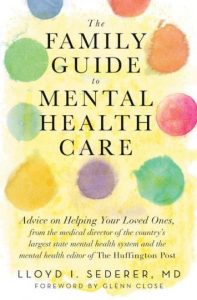 For Mental Health Awareness Month, Resources to Recover kicks off its new Family Resource Collection with the one book that is indispensable to any family facing serious mental health concerns. Dr. Lloyd I. Sederer’s The Family Guide to Mental Health Care is a comprehensive guide to the identification, care and treatment of mental illness. There may be more thorough examinations of specific diagnoses, and plenty of books have been written on the experience of mental illness in the family. But this is the only book I am aware of that covers all major mental illnesses, from first recognition to aftercare and recovery, written with families in mind.
For Mental Health Awareness Month, Resources to Recover kicks off its new Family Resource Collection with the one book that is indispensable to any family facing serious mental health concerns. Dr. Lloyd I. Sederer’s The Family Guide to Mental Health Care is a comprehensive guide to the identification, care and treatment of mental illness. There may be more thorough examinations of specific diagnoses, and plenty of books have been written on the experience of mental illness in the family. But this is the only book I am aware of that covers all major mental illnesses, from first recognition to aftercare and recovery, written with families in mind.
Dr. Sederer is the Medical Director of the New York State Office of Mental Health (OMH), the Medical Editor for Mental Health of The Huffington Post, and a prolific blogger and writer of books and articles. The Family Guide to Mental Health Care projects the expert authority you would expect from the chief clinician of the largest public mental health system in the country. Yet, he writes with the clarity of a born communicator and the sensitivity of someone who, if not having lived with mental illness in his own family, deeply understands the plight of those who have.
The Family Guide is not a defense of the public system he presides over. As a family member myself, I was grateful for the way he frankly acknowledges the limitations of that system and offers the ordinary people who may have cause to use it practical information and advice on how to get the most from it.
The book’s “Eight Guideposts to Navigating Mental Illness” are great example of this blend of expert advise and sensitivity This section of The Family Guide is so affirming of families – “trust your perceptions”, “mental illness is not your fault” – yet is also full of practical advice: “stop fighting,” “be open to reluctance and listen carefully,” “extract an agreement for a small, specific, and immediate step in the right direction.”
Eight Guideposts to Navigating Mental Illness
- Analyze the behavior.
- Remember it’s not your fault.
- Trust yourself.
- Don’t go it alone.
- Seek help as soon as possible.
- Don’t get into fights.
- Learn how to bend the mental health system to your needs.
- Settle in for the siege and never give up.
I found this section of the book so helpful that I wrote a post about it last year and even added three more Guideposts to the list:
- Take time out for your own recovery and mental health.
- Stay on the same page with other members of the family.
- Believe that your loved one and you can have a good life despite mental illness.
The Family Guide contains sections on the major mental health disorders: Depression and Anxiety Disorders, Eating and Personality Disorders, Schizophrenia, Acute Psychotic Disorder, and Bipolar Disorder. These sections of the book are informative and very clearly written. Much of this information is available on the Internet, but cannot be found anywhere else in one comprehensive, easy-to-understand printed format like this book.
Other helpful sections of the book include chapters on Principles of Good Care; Getting Help: The Referral, the Doctor, the Meeting; and The Places You May Go, which informs family members of what they may encounter in the various settings where mental illness is treated, such as outpatient clinics, emergency rooms and inpatient psychiatric units.
As a former rehabilitation specialist, I was pleased to see a chapter on the often overlooked subjects of psychotherapy and rehabilitation (see my post on Rehabilitation: The Awkward Third Wheel). The medical model of mental health care tends to focus on the treatment of acute symptoms and psychopharmacology (covered in the chapter, Medications: What to Know and What to Ask). But psychotherapy and rehabilitation services are how recovery actually occurs and it is refreshing to see such attention to these topics from the Medical Director of NY OMH.
Dr. Sederer takes a righteous and responsible view on mental health recovery, which is not just a matter of respecting patients’ right to self-determination and allowing them to make their own way through the perplexing world of life with mental illness. “Patients and their families must be willing to take the steps needed to put them on the road to recovery.”
In one of my favorite passages of the book, Sederer writes…
Family and friends must learn to set aside their confusion, sadness and anger… They must learn to overcome their reluctance to the idea that someone they love is mentally ill in order to fight for what their loved one needs to get well. All too often that battle will be with their loved one, who may not recognize that anything is wrong in the first place. Families also must become tough-minded, informed consumers and advocates for their loved one.”
Dr. Sederer may preside over the medical office of a huge mental health bureaucracy but he is anything but a bureaucrat. As one of the family members for whom this book is written, I frequently found myself thinking ‘This guy really gets it.’ He clearly understands the anguish and frustration families feel when a loved one is diagnosed with a serious mental illness and becomes involved in the public mental health system. He also has an expert understanding of mental illness and how the system works to help those affected by it.
The Internet has become the go-to source for all variety of health and health care information. Lloyd Sederer’s The Family Guide to Mental Health Care is a perfect example of why we still need printed books: all the information gathered in a single source that you can reference through a simple Table of Contents, Subject Index and Appendices. This one belongs on every family’s bookshelf.
Related posts:
First Appointments: Choosing the Right Psychiatrist, Therapist of Other Mental Health Professional
Rehabilitation: The Awkward Third Wheel in Mental Health Care
The Family Guide to Mental Health Care
Your purchases will help support the costs of running rtor.org, a free service of Laurel House, Inc., 501 (C)(3), non-profit organization.
Throughout the month of May, RtoR.org will release a daily Post
of the Day in observance of Mental Health Awareness Month
- Silver Hill Hospital: My Family’s 35-Year History with a National Leader in Quality Mental Health Care - February 7, 2023
- Connecticut Mother Who Lost a Son to Overdose Shares Her Story and Hosts Wilton Fundraiser to Benefit Laurel House - November 9, 2022
- Laurel House Offers $10,000 Racial Equity Scholarship for a Black or Hispanic Student Pursuing a Master’s of Social Work Degree - June 8, 2022



